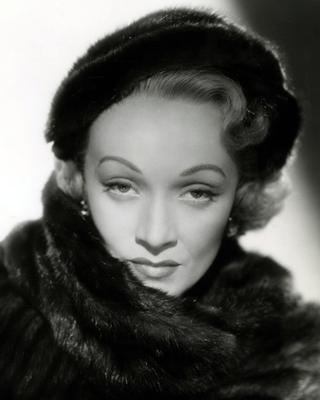
Marie Magdalene "Marlene" Dietrich was a German and American actress and singer whose career spanned from the 1910s to the 1980s.

Burt Freeman Bacharach was an American composer, songwriter, record producer, and pianist who is widely regarded as one of the most important and influential figures of 20th-century popular music. Starting in the 1950s, he composed hundreds of pop songs, many in collaboration with lyricist Hal David. Bacharach's music is characterized by unusual chord progressions and time signature changes, influenced by his background in jazz, and uncommon selections of instruments for small orchestras. He arranged, conducted, and produced much of his recorded output.

"Lili Marleen" is a German love song that became popular during World War II throughout Europe and the Mediterranean among both Axis and Allied troops. Written in 1915 as a poem, the song was published in 1937 and was first recorded by Lale Andersen in 1939 as "Das Mädchen unter der Laterne". The song is also well known on a version performed by Marlene Dietrich.
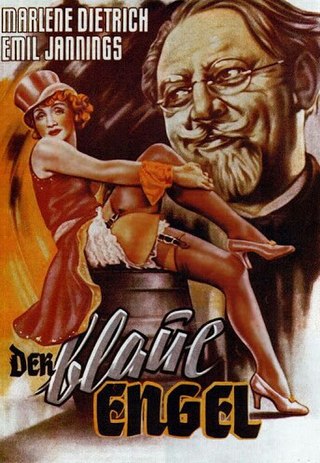
The Blue Angel is a 1930 German musical comedy-drama film directed by Josef von Sternberg and starring Marlene Dietrich, Emil Jannings and Kurt Gerron. Written by Carl Zuckmayer, Karl Vollmöller and Robert Liebmann, with uncredited contributions by Sternberg, it is based on Heinrich Mann's 1905 novel Professor Unrat and set in an unspecified northern German port city. The Blue Angel presents the tragic transformation of a respectable professor into a cabaret clown and his descent into madness. The film was the first feature-length German sound film and brought Dietrich international fame. It also introduced her signature song, Friedrich Hollaender and Robert Liebmann's "Falling in Love Again ". The film is considered a classic of German cinema.
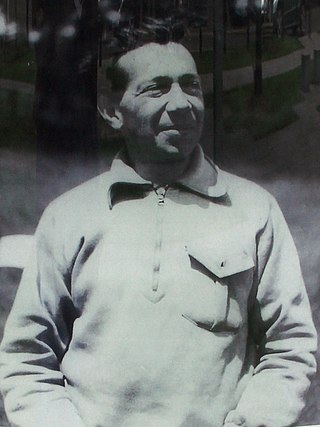
Friedrich Hollaender was a German film composer and author.

Just a Gigolo is a 1978 West German drama film directed by David Hemmings and starring David Bowie. Set in post-World War I Berlin, it also features Sydne Rome, Kim Novak and Marlene Dietrich in her final film role.
"Just a Gigolo" is a popular song, adapted by Irving Caesar into English in 1929 from the Austrian tango "Schöner Gigolo, armer Gigolo", composed in 1928 in Vienna by Leonello Casucci to lyrics written in 1924 by Julius Brammer.

"Where Have All the Flowers Gone?" is a folk song written by American singer-songwriter Pete Seeger in 1955. Inspired lyrically by the traditional Cossack folk song "Koloda-Duda", Seeger borrowed an Irish melody for the music, and published the first three verses in Sing Out! magazine. Additional verses were added in May 1960 by Joe Hickerson, who turned it into a circular song. Its rhetorical "where?" and meditation on death place the song in the ubi sunt tradition. In 2010, the New Statesman listed it as one of the "Top 20 Political Songs".
"Wives and Lovers" is a 1963 song by Burt Bacharach and Hal David. It has been recorded by numerous male and female vocalists, instrumentalists and ensembles.

Mischa Spoliansky was a Russian-born composer who made his name writing cabaret and revue songs in the Weimar Republic of the 1920s and early 1930s, before he was forced to emigrate to London in 1933 when Hitler rose to power. He stayed in Britain for the rest of his life, re-inventing himself as a composer of film scores.

Maria Elisabeth Riva is a German-born American former actress. She worked on television at CBS in the 1950s, becoming one of the first stars of early kinescope-era television. She is the daughter of actress Marlene Dietrich, about whom she published a memoir in 1992. Maria is the first person to have a career spanning nine decades.
Peter Matz was an American musician, composer, arranger and conductor. His musical career in film, theater, television and studio recording spanned fifty years, and he worked with a number of prominent artists, including Marlene Dietrich, Noël Coward and Barbra Streisand. Matz won three Emmys and a Grammy Award and is best known for his work on Streisand's early albums as well as for his work as the orchestral conductor and musical director for The Carol Burnett Show.

Marlene Dietrich's recording career spanned sixty years, from 1928 until 1988. She introduced the songs "Falling in Love Again " and "See What the Boys in the Back Room Will Have". She first recorded her version of "Lili Marlene" in 1945.

The Woman One Longs For is a 1929 German silent drama film directed by Curtis Bernhardt and starring Marlene Dietrich, Fritz Kortner and Frida Richard. It was based on the novel of the same title by Max Brod, published in Vienna by Paul Zsolnay Verlag in 1927. Made partly at the Babelsberg Studios and the Terra Studios, the film premiered on 29 April 1929 at the Mozartsaal in Berlin. The film's art direction was by Robert Neppach. It is also known by the alternative title The Three Lovers.
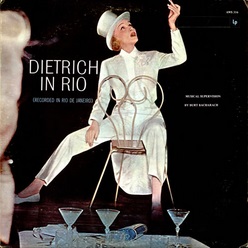
Dietrich in Rio is a live album by Marlene Dietrich, issued on Columbia Records LP, catalogue number WS 316, and reissued on CD by Sony Music Special Products. Though marketed as a "live" album, it likely consists of studio recordings done in New York, overdubbed with applause recorded on tour to create live atmosphere. Four tracks of this album can be heard without the "live" atmosphere on 1991's CD: The Marlene Dietrich Album.

Wiedersehen mit Marlene is a Marlene Dietrich's live album, issued on Electrola, catalogue number 1C 062-28 473 MD, in Germany. The American pressing on Capitol Records does not include "Kinder, heut' abend, da such ich mir was aus".

Live at the Café de Paris is a live album by Marlene Dietrich, recorded in London, at her opening night in Café de Paris on June 21, 1954. The orchestra was conducted by George Smith. Dietrich is introduced by Noël Coward.
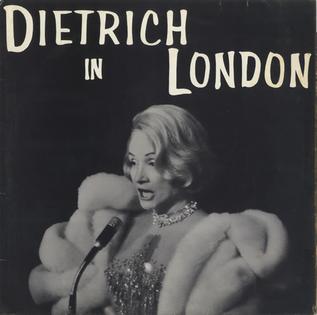
Dietrich in London is a Marlene Dietrich's live album. The album was issued on Columbia Records OS 2830. "Marlene Dietrich in London" opened on November 23, 1964, at the Queen's Theatre. This recording was produced on the closing night, December 12, 1964. The album was released in Australia, by Philips Records in 1965, coincide with her visit in the country.

Marlene Dietrich Overseas was the first Marlene Dietrich album. The orchestra was conducted by Jimmy Carroll, and it was I ssued on 10" LP by Columbia Records. All the vocals are in German, translated by Lothar Metzl. It was reissued on 12" LP by Columbia as Lili Marlene with the addition of the following tracks: "Das Hobellied", "Du Liegst Mir im Herzen", "Muss i denn" and "Du Hast die Seele Mein". The eight songs were re-released in CD on a compilation album, Art Deco - The Cosmopolitan Marlene Dietrich.
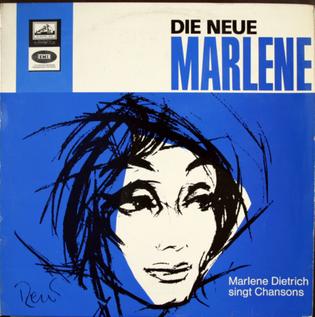
Die neue Marlene is a studio album by Marlene Dietrich, released by Electrola in 1965. It was issued in the UK on His Master's Voice and released in the US by Capitol Records under the title Marlene — Songs in German by the Inimitable Dietrich. The album peaked at #34 in the German charts. The song "Die Antwort weiß ganz allein der Wind" was released as a single with "Sag mir, wo die Blumen sind" as its B-side.

















